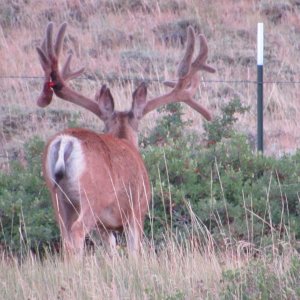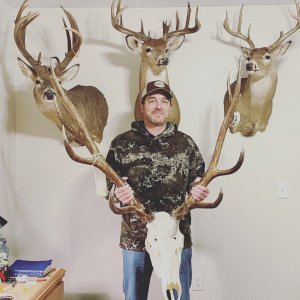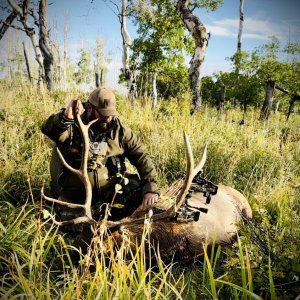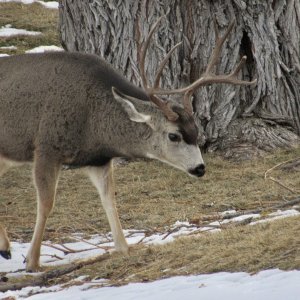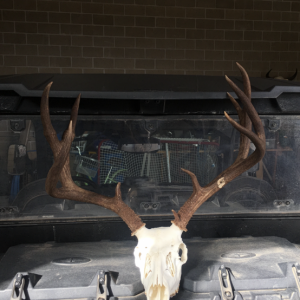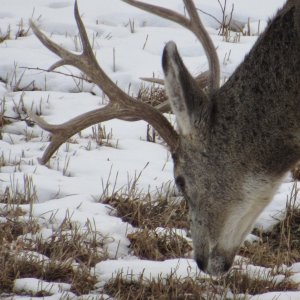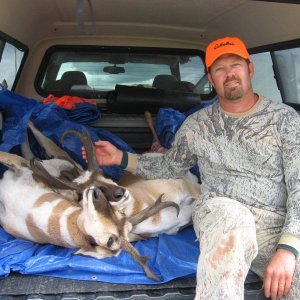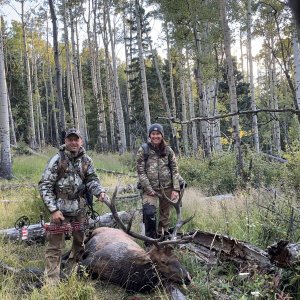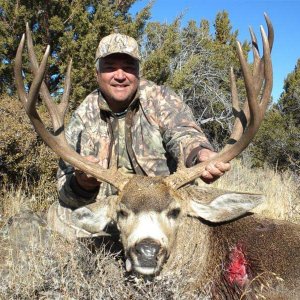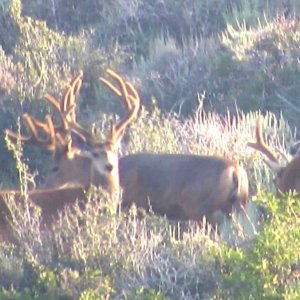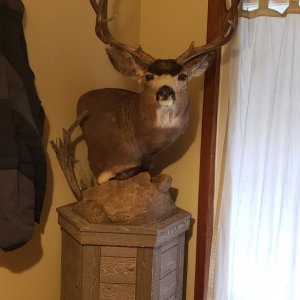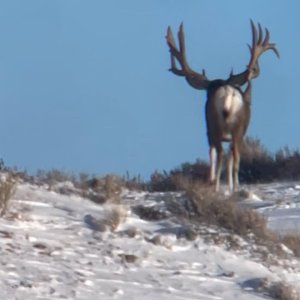wileywapati
Very Active Member
- Messages
- 1,808
Poachers making a killing in West's oil and gas fields
Winter accessibility now better due to new roads
By Patrick O'Driscoll
USA Today
DENVER ? Intense drilling for natural gas and oil in the Rocky Mountain West is triggering a rise in the illegal killing of elk, deer and other "trophy" game because new roads make remote areas accessible in winter, wildlife managers report.
Parts of Wyoming, Colorado and New Mexico are flooded with crews working thousands of well sites and drill rigs. The result: more people among wildlife herds.
"The road densities in these areas have quadrupled. And they keep them plowed in winter," says Dave Hays, a warden in southwestern Wyoming for the state Game and Fish Department. "They see all these big game right there, in places where maybe you never see anybody for 30 miles, and they think, 'Why not?'"
Statistics on the illegal killing of game, or poaching, are hard to tally because most states track only prosecutions. Authorities in Wyoming, Colorado and New Mexico say wardens are finding more headless carcasses, a sign of killings solely for trophies.
More poaching "is something we have noticed as more and more oil and gas exploration and drilling goes on," says Dan Williams of the New Mexico Department of Game and Fish. "We're constantly out there, investigating cases."
Poaching occurs year-round in every state, but winter is the most vulnerable time in the interior West. Snow drives herds from higher elevations to once-remote valleys that now are crisscrossed with thousands of miles of roads.
Hays and wardens in other states say the poaching isn't just by energy company workers. Easier road access attracts opportunists seeking trophies for the wall.
Drill-rig worker Joseph Chapman, 36, of Provo, Utah, pleaded guilty this month to felony charges for killing a big-racked mule deer in northwest Colorado last Thanksgiving. Under a proposed plea bargain, he could be fined up to $100,000. He also could lose hunting privileges for a year to life here and in 23 other states that cooperate in tracking and prosecuting poachers.
Hays says the cases wildlife officials investigate are only a fraction of the losses.
"The biggest problem is poaching for economic gain to feed the black market (with) trophy elk and mule deer heads, those kinds of things," says Steve Torbic of the National Wildlife Federation.
Wyoming Game and Fish reports that unlicensed hunting and fishing infractions in 2005 doubled to more than 880 from a decade earlier. Big-game violations were up 58 percent, with most of the growth during the recent oil-and-gas boom.
Wardens are trying to fight back:
Wyoming keeps a DNA database for several states with tissue from headless carcasses. States can compare those genetic samples with DNA from trophy heads and antlers taken from suspected poachers. Wyoming's most intense drilling areas, in the western half of the state, are home to an estimated 100,000 deer, 100,000 pronghorn antelope, and elk, moose and other wild species.
Colorado uses unmarked vehicles and plainclothes wardens in its winter-range patrols. The state also hired a former energy company staffer to work with the oil and gas firms on wildlife. Northwestern Colorado, where most of the new drilling takes place, has the state's two largest elk herds.
New Mexico conducts night flights in the northwest part of the state to seek poachers who "spotlight" elk and deer after dark. Game decoys are deployed to lure illegal hunters.
The energy boom brings more people and roads into wildlife habitat. Of the 55,000 square miles of oil and gas leases on federal lands in the West, more than 43,000 are in Wyoming, Colorado, New Mexico and Utah. The area is dotted with thousands of well sites.
"We haven't seen the tip of the iceberg," says Ron Velarde, northwest manager for the Colorado Division of Wildlife. "I've seen estimates of 50,000 more gas wells."
Energy companies work to prevent poaching. They brief workers on the laws and bar guns from worksites and employee vehicles. EnCana, a major natural gas firm operating in northwestern Colorado, conducts random searches with gun-sniffing dogs. "It's just another way of telling all the work force that we're very serious about no weapons on our locations," says Darrin Henke of EnCana.
The company also contributes to Colorado's Operation Game Thief, which rewards cash to tipsters who report poachers. Similar programs are in virtually every state.
"A lot of our guys love to hunt and fish," says Rick Robitaille of Anadarko Petroleum. "They're pretty upset when somebody does something wrong themselves."
Winter accessibility now better due to new roads
By Patrick O'Driscoll
USA Today
DENVER ? Intense drilling for natural gas and oil in the Rocky Mountain West is triggering a rise in the illegal killing of elk, deer and other "trophy" game because new roads make remote areas accessible in winter, wildlife managers report.
Parts of Wyoming, Colorado and New Mexico are flooded with crews working thousands of well sites and drill rigs. The result: more people among wildlife herds.
"The road densities in these areas have quadrupled. And they keep them plowed in winter," says Dave Hays, a warden in southwestern Wyoming for the state Game and Fish Department. "They see all these big game right there, in places where maybe you never see anybody for 30 miles, and they think, 'Why not?'"
Statistics on the illegal killing of game, or poaching, are hard to tally because most states track only prosecutions. Authorities in Wyoming, Colorado and New Mexico say wardens are finding more headless carcasses, a sign of killings solely for trophies.
More poaching "is something we have noticed as more and more oil and gas exploration and drilling goes on," says Dan Williams of the New Mexico Department of Game and Fish. "We're constantly out there, investigating cases."
Poaching occurs year-round in every state, but winter is the most vulnerable time in the interior West. Snow drives herds from higher elevations to once-remote valleys that now are crisscrossed with thousands of miles of roads.
Hays and wardens in other states say the poaching isn't just by energy company workers. Easier road access attracts opportunists seeking trophies for the wall.
Drill-rig worker Joseph Chapman, 36, of Provo, Utah, pleaded guilty this month to felony charges for killing a big-racked mule deer in northwest Colorado last Thanksgiving. Under a proposed plea bargain, he could be fined up to $100,000. He also could lose hunting privileges for a year to life here and in 23 other states that cooperate in tracking and prosecuting poachers.
Hays says the cases wildlife officials investigate are only a fraction of the losses.
"The biggest problem is poaching for economic gain to feed the black market (with) trophy elk and mule deer heads, those kinds of things," says Steve Torbic of the National Wildlife Federation.
Wyoming Game and Fish reports that unlicensed hunting and fishing infractions in 2005 doubled to more than 880 from a decade earlier. Big-game violations were up 58 percent, with most of the growth during the recent oil-and-gas boom.
Wardens are trying to fight back:
Wyoming keeps a DNA database for several states with tissue from headless carcasses. States can compare those genetic samples with DNA from trophy heads and antlers taken from suspected poachers. Wyoming's most intense drilling areas, in the western half of the state, are home to an estimated 100,000 deer, 100,000 pronghorn antelope, and elk, moose and other wild species.
Colorado uses unmarked vehicles and plainclothes wardens in its winter-range patrols. The state also hired a former energy company staffer to work with the oil and gas firms on wildlife. Northwestern Colorado, where most of the new drilling takes place, has the state's two largest elk herds.
New Mexico conducts night flights in the northwest part of the state to seek poachers who "spotlight" elk and deer after dark. Game decoys are deployed to lure illegal hunters.
The energy boom brings more people and roads into wildlife habitat. Of the 55,000 square miles of oil and gas leases on federal lands in the West, more than 43,000 are in Wyoming, Colorado, New Mexico and Utah. The area is dotted with thousands of well sites.
"We haven't seen the tip of the iceberg," says Ron Velarde, northwest manager for the Colorado Division of Wildlife. "I've seen estimates of 50,000 more gas wells."
Energy companies work to prevent poaching. They brief workers on the laws and bar guns from worksites and employee vehicles. EnCana, a major natural gas firm operating in northwestern Colorado, conducts random searches with gun-sniffing dogs. "It's just another way of telling all the work force that we're very serious about no weapons on our locations," says Darrin Henke of EnCana.
The company also contributes to Colorado's Operation Game Thief, which rewards cash to tipsters who report poachers. Similar programs are in virtually every state.
"A lot of our guys love to hunt and fish," says Rick Robitaille of Anadarko Petroleum. "They're pretty upset when somebody does something wrong themselves."

